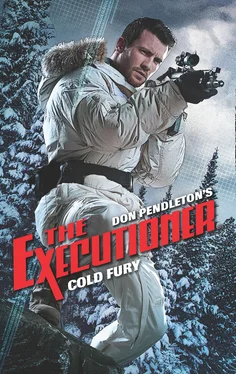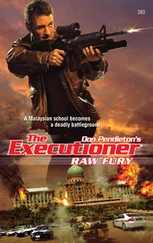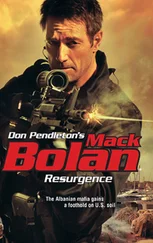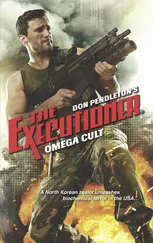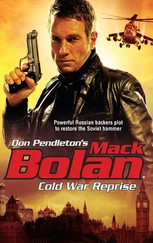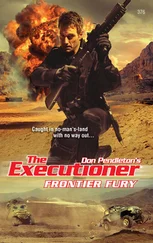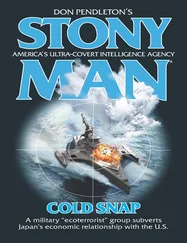A flash of movement in Bolan’s peripheral vision caused him to automatically crouch and step back, avoiding a thunderous blast from a biker’s sawed-off 12-gauge shotgun. The charge missed Bolan completely but clipped two of his fellow bikers. One gripped his chest as a torrent of red began to pour from a gaping hole. The second man, hit in his substantial gut, managed to pull a blue-steel Colt 1911 from his belt.
The Executioner fired two rounds into the forehead of the biker with the sawed-off and the man’s legs twisted together as he did an untidy pirouette to the floor. Bolan then swung his MP-5 back and shot the biker drawing the .45. That one crumpled, as well. Beyond the fallen man, Grimaldi faced the final biker as the last of the Jumpsuits pointed what Bolan saw was a Glock pistol at the Stony Man pilot. Having little choice, he raised his subgun and fired, the round coring his adversary’s head.
Although it seemed that all of their adversaries were down and dead, Bolan and Grimaldi took the time to make sure of that before moving forward, searching and checking the space as they went. It took them several minutes to clear the remainder of the building, which was basically a large space devoid of anything except a collection of Harley-Davidson motorcycles, spare parts, work cubicles and a few empty lockers.
Satisfied that no other adversaries remained, they returned to the center of the large room. An overturned briefcase lay on the floor next one of the motorcycles.
Grimaldi picked up the briefcase, popped open the clasps and lifted the lid. He grinned broadly then emitted a low whistle. The briefcase was lined with stacks of US currency.
“Looks like somebody was buying something,” he said, shutting the briefcase after he was sure Bolan had seen the contents. “Maybe we’ll get paid this time.”
“Yeah, right.”
All of the motorcycles had Washington plates, but the Lexus and the semi had Canadian tags. The SUV had virtually nothing of interest. Neither did the truck’s cab, except for papers listing the owner as Universal Exports out of Vancouver, British Columbia, and a Canadian customs declaration and bill of lading for “prepackaged, sealed food products.”
“Let’s check the back of the truck,” Bolan said. “Then go through these guys for any IDs.”
The Executioner was disappointed that none of the gunners had survived. He’d been hoping to gather some intel, other than what he already knew about the motorcycle gang. Like most one-percenters, these bikers ran the gamut in illegal activities. Their connection to the men in the black jumpsuits was still open to conjecture.
Grimaldi found a crowbar, hopped up on the rear bumper of the trailer and grabbed the handle securing the doors. He stuck the end of the metallic claw between the hasp of the padlock and bore down hard. The metal held for a few seconds then gave way and the base of the lock clattered onto the concrete floor. Bolan brought up his MP-5 and pointed it at the set of double doors as Grimaldi thrust one open and moved aside.
The interior of the truck bed was stacked with cardboard boxes marked Gold Star Noodles. A narrow aisle ran down the center to a solid base of boxes against the rear wall. The trailer was packed so tight that Bolan had to turn sideways to edge toward the rear. He took out his knife, flipped it open and sliced off a portion of the side of one of the boxes. Brightly colored plastic-encased packages of wiry dried noodles were inside. The Executioner began systematically cutting open each box in the stacks on the right side. None yielded anything but packages of noodles. He stopped and glanced at the other stacks. The printed inscription on all of the boxes appeared to be uniform. After replacing his knife, Bolan edged back down the center aisle to the open rear doors.
“Let’s start checking those guys.”
After piling all of the recovered weapons on one of the benches, Bolan and Grimaldi began going through the pockets of the dead men, placing their belongings on top of each corpse. The bikers all carried wallets and the usual assortment of contraband. The men in the black jumpsuits had nothing in the way of identification, but each had a cell phone.
Bolan felt something substantial in the last dead man’s pants’ pocket and withdrew a rather bulky phone. A satellite phone. As he placed it on top of the corpse, it vibrated with an incoming call.
Grimaldi’s face lit up. “Hot damn. Maybe that’ll give us something.”
The Executioner picked up the phone and saw that it was locked. After studying the screen, he determined it had a fingerprint passcode. The holster on the dead man’s belt was on his right side. Bolan pressed the dead man’s right thumb against the home key, but nothing happened. Not wanting to trigger some kind of automatic safeguard that would lock him out after too many unsuccessful tries, Bolan weighed the possibilities before selecting another digit. This time he pressed the dead man’s right forefinger against the screen and the phone unlocked, going immediately to the text section.
Bolan watched as the letters formed on the screen.
“Aw, hell,” Grimaldi said. “Is that language what I think it is?”
Bolan studied the script for a few seconds more. It was the Cyrillic alphabet. He snapped a picture of it with his cell phone.
“Yeah, it’s Russian,” he said.
The Bering Strait
Nikoloz Rokva held the cell phone in front of him for several minutes, waiting for a reply from Yuri. But none came. That troubled him slightly. He hadn’t wanted to split up this shipment, but the fragmented transport had become a necessity due to the inclement weather they’d experienced when meeting up in Siberia. The stopover at the last gulag had proved more problematic and lengthy than anticipated, but Rokva hoped it would be ultimately more profitable this time.
Profit, he thought, was the name of the game.
He removed his thick, oval-shaped glasses and massaged the bridge of his nose, reminding himself that the burden of command weighed heavily on one, even though he’d spent his army time as an analyst in military intelligence rather than as a field officer.
The phone in his cabin rang and he picked it up.
It was Fedor Udom. “Some of these assholes are getting sick. The men mostly. They are puking and shitting all over the place.”
“Has Boris finished taking the samples?”
“Hours ago.”
“Good. Just keep them all confined, then. We are almost there.”
He terminated the call, replaced his glasses and took out one of his long cigarettes, mashing the hollowed-out end to form a filter. The briny smell of the sea was omnipresent. Perhaps the earthy resonance of human excretions would be welcome in the hold.
The ship pitched and bounced a bit as the waters were getting rougher, and he wondered how close they were to shore. He pulled the phone from the cradle and pressed the button to speak to the captain.
“How long before we arrive?” Rokva asked, holding his lighter to the cigarette.
“Very soon. Why?”
“Some of the cargo is getting sick.”
The captain’s laugh was a harsh bark. “No sea legs, eh? They should count their blessings we are not on an extended voyage. I could tell you stories of some of the rough crossings.”
“Yes, I’m sure you could. Just advise me when we’re getting close.”
“I will,” the captain said. “But know this. We’re going to leave as soon as we drop you there. There’s a storm coming and we must get back across.”
Not bothering to reply, Rokva hung up, stood and then stretched. He hated sea travel, although the relatively short jaunt across the Bering Strait between Russia and the Alaskan coast was not that stressful. And the rewards were certainly great. He leaned against the narrow bunk and settled his stockinged feet into his boots. He glanced at the phone. Yuri had still not responded and Rokva pondered the wisdom of sending another text.
Читать дальше
